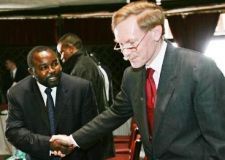US urges Darfur rebels factions to unite
Nov 8, 2005 (NAIROBI) — The United States urged rival factions of Darfur’s main rebel group to unite before resuming peace talks with the Khartoum government aimed at ending 32 months of civil conflict in western Sudan.
 US Deputy Secretary of State Robert Zoellick said the splintered Sudan Liberation Movement (SLM) should ensure it returns to talks on November 21 in Nigerian capital Abuja as a united front.
US Deputy Secretary of State Robert Zoellick said the splintered Sudan Liberation Movement (SLM) should ensure it returns to talks on November 21 in Nigerian capital Abuja as a united front.
“The SLM needs to return to the next round of Abuja negotiation … with a common approach,” Zoellick told a press conference after holding talks with SLM factions in Nairobi at the beginning of a six-day Sudan tour to boost the flagging peace talks and press for peace and security.
“The problems of Darfur will not be solved by more violence,” he said, urging both sides to refrain from truce violations that have undermined previous rounds of peace talks.
Both sides have violated a ceasefire signed in 2003 aimed at improving security for displaced people and ensuring a smooth flow of humanitarian supplies.
The November 21 resumption of peace talks among the SLM, another Darfur rebel group, Justice and Equality Movement (JEM), and the government, have been clouded by a rift in SLM that was caused by a scramble for power.
But the talks may be jeopardized by the SLM’s leadership crisis following last week’s election of SLM’s secretary general Mani Arko Minawi as the new leader to replace Abdul Wahid Mohammed Nur, the group’s founder.
But Nur insisted he was the legitimate leader of the biggest rebel group in Darfur, an arid region the size of France, and welcomed the rival faction back into the fold.
“Those who claim that they formed SLM will (only) be a faction,” Nur told reporters after meeting Zoellick.
“The group caused many problems to SLM. We are very happy because we have space to act freely and to implement all our programmes,” he added.
Nur, however, said both factions shared a similar vision of helping the impoverished and displaced civilians in Darfur, who claim they have been marginalized by successive regimes in Khartoum.
“We are appealing to them. We are doing this for the sake of our people because we need peace,” said Nur. “The enemy is the government, the enemy is not a faction.”
War broke out in Darfur in February 2003 when the JEM and the SLM/A launched armed rebellion against what they say is political and economic marginalization of the region’s black African tribes by the Arab-led regime in Khartoum.
In The Hague on Tuesday, the head of a Sudanese non-governmental organisation monitoring Darfur, Osman Hummaida, said that during a stalement: “In the last two months the humanitarian and security situation has deteriorated dramatically,”
Hummaida, who was in the Dutch capital for talks with members of other NGOs and officials of the International Criminal Court (ICC) mandated to investigate war crimes in Darfur, is the director of the Sudan Organisation Against Torture (SOAT).
He told a press conference there were reports of dozens of women raped by Arabic Janjaweed militias, together with reports of continued arrests of civilians by security forces and a dramatic increase in the number of internally displaced people.
Between 180,000 and 300,000 civilians have since been killed — many of them in brutal raids by the government-backed Janjaweed mounted militia — and more than two million villagers have been driven from their homes and into camps.
The African Union has deployed a peacekeeping force to monitor a shaky ceasefire.
Last week, Sudan Vice President Salva Kiir said a Darfur peace deal could be reached by year’s end if officials from the semi-autonomous government of southern Sudan joined the peace process.
The US was a key partner in peace talks between Khartoum government and former southern rebels, Sudan People’s Liberation Movement (SPLM) that yielded a peace deal in January, ending 21 years of fighting.
(AFP/ST)
